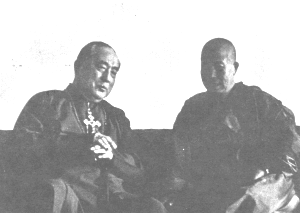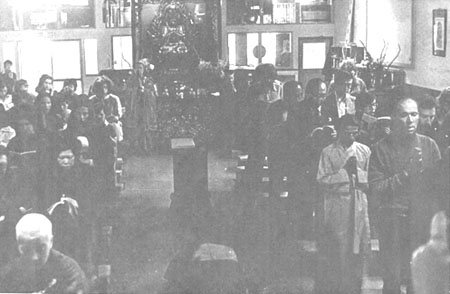HIS
EMINENCE PIEN, CARDINAL YU VISITS GOLD MOUNTAIN

On May 19th, 1977, His Eminence, Yu Pien, a Cardinal in the Catholic Church and Principal of Taiwan Catholic University, paid respects on the Venerable Abbot of Gold Mountain. The following conversation transpired:
Cardinal: Many people have asked after your health. You are looking very well to me.
Abbot: Who asked about my health?
Cardinal: The people who met you in Taiwan. They wonder how you are and I told them when I came this time I would come and see you.
Abbot: Ten them I've already died.
Cardinal: You've died to the world. Like us, we also have died to the world.
Abbot: When I was in Manchuria I was called the "Living Dead Man." In Hong Kong I had another name and when I got to America my name became the "Monk in the Grave." The meaning being that I will not contend. I will not fight with people. You can call me a cat if you like, call me a dog if you like. All the good things are for others, the bad things are mine.
Cardinal: You have a lot of courage.
Abbot: So I don't criticize other people, and I don't criticize other religions. I see their errors as my own.
Cardinal: I've never thought of it that way before. I always think if people have errors they should change them. I never thought of them as my own errors. That concept shows the union of heaven and earth. What's yours is mine; what's mine is yours.
Abbot: That's really the way I am. I absolutely will assume everyone else's faults to be my own. The mistakes of any religion are my own. I admit that I am a worthless disciple of Shakyamuni Buddha.
Cardinal: That's not for certain... Do you also think that you have a share in all the good that is done?
Abbot: I don't think that.
Cardinal: You don't think that, huh.
Abbot: I think that all the people that are doing good things are helping me do good things. I can't do good things, and they can. So they are helping me.
Cardinal: So the good people are your friends who help you. And the evil ones you take responsibility for. That's a broad point of view. In Catholicism we have this idea: everyone has a share in the good. It's everyone's good. Evil? We should also admit that there is evil.
Abbot: That's a1 right but it's not explicit.
Cardinal: Do you pray for the good of others?
Abbot: Yes. When I was twelve I began bowing to my parents. Later, not only did I bow to my parents, I bowed to heaven and earth, officials, parents, and teacher. Then I started bowing to the world's great good people because the good they do can influence others to do good, so I should thank them. I also bowed to the great immortal beings and the great sages of the world, the great filial ones and eventually I started bowing to the great evil people of the world. Why did I bow to them? I repented on their behalf, hoping that they would change their evil and go toward the good. So every time I bowed, I did more than five hundred prostrations. Where did I bow? In the morning before others had awakened, I went outside to bow. And at night after everyone was asleep I went outside to bow. If it was raining, I bowed. If it was snowing, I bowed. In Manchuria it snowed a lot and I would put my hands down in the snow and make a full prostration just the same. Why was I so stupid as that? I felt that if everyone in the world was smart, the smarter the world got, the worse it would get. So I did this stupid thing hoping that the world would not get so bad so fast.
Cardinal: Your idea and motive are very good, very pure, and of great value. God will bless you.
Abbot: So now I am a Buddhist disciple and I want to hand on the proper knowledge and proper views of Buddhism to all people. Wherever I go there certainly must be proper Dharma. I do not permit the Dharma ending age. In Buddhism the Dharma's end is spoken of but I do not permit the Dharma's end to come. What I hand on pervades empty space to the bounds of the Dharma-realm. There is nothing it does not include. Sour, sweet, bitter, hot, and salty, good and bad—they are all in the Dharma-realm. The good does not transcend the Dharma-realm and the bad is not outside the Dharma-realm. In this world, everyone likes things to be clean, but you can't get along without toilets. If one didn't have a toilet, what would one do?
Cardinal: Chuang Tze spoke like that. In this day and age no one dares talk like that. But here you are saying this...
Abbot: Cardinal, I will be even bolder and tell you something else. I mentioned this a few nights ago in a lecture. I say that the scientists are really messing things up. What they are doing lacks intelligence. What are they messing up? They are as if counting the sands in the sea. They're never going to get it straight. Sometimes they're going to come out with a grain too many and sometimes with a grain too little. They're never going to be able to count accurately exactly how many grains of sand there are in the sea. Besides which, they'll never finish counting. The more they count the more mixed up they're going to get. So I can say that scientists are the stupidest of people.
Cardinal: You'll make them mad.
Abbot: I'll say it even if they do get mad.
Cardinal: Scientists intend to conquer the material world, it's true. But even if they conquer the material world, there is still the spiritual world, which they can't do anything about.
Abbot: Right. They are just putting a head on top of a head. Riding a donkey to find a donkey.
Having paid his respects, the Cardinal took his leave, expressing his appreciation to the four-fold assembly for their greetings and good wishes.
----------------------------------------
THE SIXTH PATRIARCH'S DHARMA JEWEL PLATFORM SUTRA, with commentary by Tripitaka Master Hsuan Hua, will be appearing in paperback, (second edition) in the fall of 1977. In the Chapter titled "Final Instructions" the Great Master explains, "...if asked about existence, answer with non-existence; asked about non-existence, answer with existence; asked about common, answer with holy; asked about holy, answer with common. As the two principles are mutually dependent, between them will arise the principle of the Middle Way. If for every question, you answer with an opposite, you will not stray from the basic principle. Available in the fall in 1977 from the Buddhist Text Translation Society.
